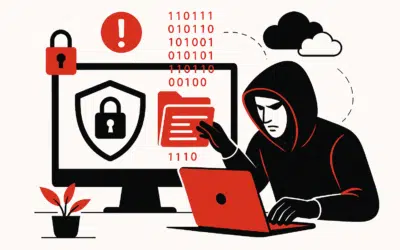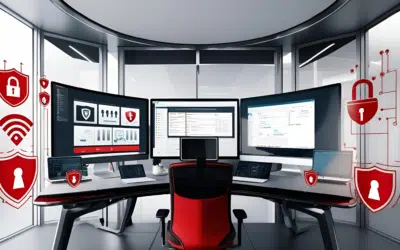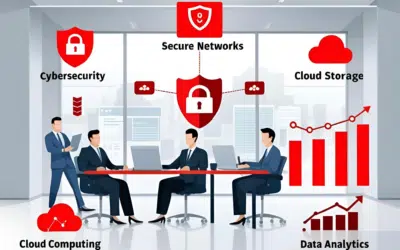Small businesses can be attractive targets for cyber attacks. The belief that hackers only chase large corporations is dramatically misplaced. In fact, small businesses, due to often less advanced security measures, are simpler targets. Their valuable data and potential access to larger networks further add to their appeal for cybercriminals.
As a result, small businesses are prime targets for cyberattacks, facing risks like phishing scams, ransomware, and internal threats from human error. These threats can cause major disruptions, financial losses, and long-term damage to your reputation. To stay ahead, businesses must implement strong security measures that address vulnerabilities across the business. This post breaks down the most common threats and outlines straight-forward for protecting your business.
We also explore the benefits of partnering with a managed Security Operations Center (SOC) to keep your business secure around the clock. With constant monitoring and rapid response, a SOC can identify and mitigate any threats before they cause damage. For small businesses in North Texas, we highlight how to choose the right cybersecurity partner to ensure your business is protected and prepared for future challenges.
Understanding Cybersecurity for Small Businesses
Common Cyber Threats
Phishing, ransomware, and malware are prevalent cyber threats facing small businesses. Phishing scams manipulate employees into revealing sensitive information via deceptive emails. Ransomware is a malicious software that uses encryption to hold your data hostage, demanding a ransom to regain access. Malware infiltrates your system, often undetected, causing damage and exposing sensitive data. Remember, these threats can disrupt your operations and lead to a substantial loss of data and revenue.
Alongside external threats, internal threats often originate from accidental mistakes by employees. Insider threats and human errors significantly contribute to data breaches. A lost laptop, a weak password, or an accidental click on a malicious link can expose your systems and data to substantial risk. Prioritizing staff education and fostering a strong awareness of cybersecurity is essential.
Staying Ahead of Cyber Threats
The cyber threat environment is always changing as cybercriminals improve their tactics. As such, you should be adaptable and flexible in your cybersecurity approach. Ensuring constant updates on your security protocols and being knowledgeable about recent threats is crucial. These steps not only protect your operations against present threats but also prepare you for future challenges. A thorough approach to security could entail the utilization of systems that detect intrusion, solutions that backup data securely, and relentless surveillance for any questionable activities. Every step towards improved cybersecurity helps protect your operations from threats.
Crucial Cybersecurity Measures for Small Businesses
Network Security: Firewalls, VPNs, and Encryption
Strong network security serves as the cornerstone of cybersecurity for small businesses. A potent firewall, the initial line of defense, inspects and filters traffic, keeping bad actors out of your network.
Adding a Virtual Private Network (VPN) to your cybersecurity toolkit provides further security layers. A VPN encrypts your internet connection, anonymizing your online activity and protecting your data from hackers.
Encryption, another vital technique, secures your data by converting it into an unreadable format. Only a unique key can decrypt this data, ensuring its safety, whether in transit or at rest.
Endpoint Security: Antivirus and Patch Management
Endpoint security focuses on protecting network-connected devices like desktop computers, laptops, smartphones, and IoT devices. Installing reputable antivirus software on these devices is essential. The software scans, detects, and eliminates viruses and other harmful programs.
Patch management, another component of endpoint security, involves timely installation of software updates. These patches fix vulnerabilities in programs and secure your devices against known threats. An unpatched device can be an easy target for cybercriminals.
Endpoint monitoring is also another tool to consider. These tools can identify unusual behavior, potentially signaling a cyber threat. Prompt response to these alerts can prevent a cyber attack.
Implementing these cybersecurity measures doesn’t necessitate a deep tech understanding, but it does demand a commitment to safety. A robust cybersecurity strategy is an ongoing process, not a one-time task. As the cyber threat environment evolves, your defenses must adapt.
Essential Training for Employees
Shielding your company from cyber threats effectively involves more than just security measures—it demands a shift in mindset and behavior. A culture of cyber awareness, where all employees take cybersecurity seriously, creates a robust human firewall complementing your digital defenses. Such a culture necessitates ongoing vigilance and training to counter new threats.
Understanding Phishing and Social Engineering
Phishing and social engineering are common infiltration tactics used by cybercriminals against businesses. It’s vital to train your employees to recognize these threats so they know how to respond or what to do. Understanding deceptive emails or impersonation tactics used in these attacks is key.
- Examine the sender’s email address for irregularities.
- Inspect unexpected email attachments or links cautiously.
- Be wary of urgent or high-pressure language in the email subject line.
- Challenge any email that requests sensitive personal or company information.
Utilizing Strong Passwords and Multi-Factor Authentication (MFA)
Strong passwords and MFA are critical elements of cybersecurity. Encourage employees to create complex, unique passwords for their accounts and consider using a reputable password manager to handle multiple passwords securely. MFA, which involves multiple authentication methods, adds an extra layer of protection. It could be a password (something the user knows), a security token (something the user has), or a fingerprint (something the user is). Even if a password is compromised, MFA drastically reduces the likelihood of unauthorized account access.
Remember, informed and well-trained employees are your first line of defense against cyber threats.
Managed Security Operations Centers for Small Businesses
Constant Monitoring and Threat Detection
Picture a team of cybersecurity experts vigilantly safeguarding your business non-stop. That’s what a managed Security Operations Center (SOC) offers. They work ceaselessly, scrutinizing your network, applications, and systems for any hint of abnormal activity. When they identify something out of the ordinary, they act immediately.
With advanced tools and technologies, they can spot and categorize threats early on, often before they inflict notable damage. These threats range from exploiting software vulnerabilities to insider threats or even complex cyber attacks. Having such vigilant monitoring can be crucial in the field of cybersecurity where time is of essence.
Incident Response and Prevention Strategies
Spotting a threat is vital, but responding to it effectively is equally important. A managed SOC excels in both areas. Upon threat detection, they initiate an efficient response, which could involve isolating affected systems to contain the threat and eliminating the malicious software.
What distinguishes a managed SOC is their ability to learn from each incident. Post threat mitigation, they conduct a detailed analysis to understand the cause of the attack and how to prevent similar future incidents. This ongoing learning process is crucial in adapting to the constantly changing threats in cybersecurity. The ultimate aim is not just to react to attacks, but to proactively prevent them.
Selecting a Suitable Cybersecurity Partner in North Texas
Just like choosing a teammate, selecting the right cybersecurity partner requires finding someone who understands the unique challenges of your terrain. In North Texas, this requires a partner experienced in local threats and business culture, someone who can anticipate risks and respond promptly.
Proactive measures are crucial in the dynamic field of cybersecurity. Waiting for threats to occur before acting often leads to severe damage. Your ideal cybersecurity partner will use advanced technologies to identify and neutralize threats before they become a real risk. Continuous monitoring of your systems will keep you one step ahead of cybercriminals.
Clear, comprehensive communication is also vital. Regular security status updates, immediate threat alerts, and accessible support are all crucial. Transparency builds trust and allows you to concentrate on your business, knowing your cybersecurity is well-managed.
Personalized Cybersecurity Solutions for North Texas Small Businesses
Each business is unique and requires a cybersecurity partner who recognizes this and offers tailored solutions. Whether you’re a start-up with limited resources or a larger business with more complex systems, your partner should design a security strategy that fits your needs perfectly.
As your business grows, your cybersecurity solutions should grow with it. You don’t want to outgrow your security measures and find yourself vulnerable. A flexible, scalable cybersecurity plan will ensure your data and systems stay secure, no matter how much your business grows or changes.
At Axxys Technologies, our team of North Texas engineers understands the local landscape and the threats common to businesses like yours. Our experience and expertise mean that Axxys knows how to protect North Texas small businesses from data breach and network downtime due to hackers.
Don’t stand by and wait for a cyberattack to act. Implement strong security protocols, educate your team, and consider partnering with a reputable source like Axxys Technologies. The secure future you seek begins with one proactive decision. Contact us for custom cybersecurity solutions that fit alongside your operations.








